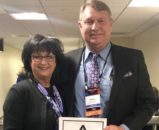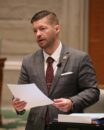ST. LOUIS – A federal program awarded Missouri a grant this week to help fight heroin and opiate overdose deaths.
The Substance Abuse and Mental Health Administration announced the Missouri Department of Mental Health along with the Missouri Institute of Mental Health and the National Council on Alcoholism and Drug Abuse-St. Louis Area (NCADA) as the recipient of the grant.
“These resources will go a long way toward helping folks here in St. Louis and across Missouri who’ve been affected by the opioid epidemic,” said U.S. Sen. Claire McCaskill. “This is a public health crisis that’s shaken our state and communities across the country, and organizations like NCADA that partner with first responders to provide critical, life-saving services play an integral part in helping to turn this epidemic around. That’s why I’m so pleased to help support these resources for important programs that are making a difference in Missouri.”
NCADA anticipates using the grant to provide training on the use of naloxone. Naloxone is the rug given to first responders to help rescue people undergoing a drug overdose.
The grant also enables NCADA to give the drug to more than first responders. The agency projects to provide thousands of naloxone kits over the life of the grant.
“This grant enables us to substantially expand many of our existing efforts,” said Howard Weisman, executive director of NCADA. “We will be able to expand our footprint into communities and educate more people about prescription opioids and heroin, what they can do to make their homes and communities safer places, and save the lives of others. Getting naloxone in the hands of every first responder is long overdue, and this grant will allow that to happen.”
The grant will also provide resources for educating community leaders and the public about the heroin epidemic and will provide assessment and referral for those who need treatment.
“We are thrilled to partner with the Department of Mental Health and NCADA on this vitally important work,” said Dr. Robert Paul, executive director of the Missouri Institute of Mental Health. “Only twelve states received one of these grants, that Missouri was among them speaks volumes about the strength of our proposal, but also the depth of our need. This grant will help us save lives, and nothing could be more important.”














